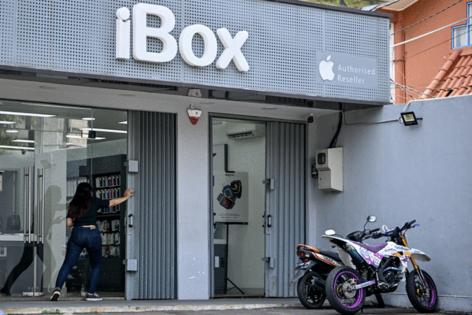Catherine Thorbecke: Indonesia's iPhone 16 ban sends the wrong message
Published in Op Eds
Even the world’s fourth most-populous country, which has more active cell phones than people, seems to be no match for Apple Inc.
Indonesia’s ban on the sale of iPhone 16s after the company failed to meet local investment requirements didn’t faze investors. Shares of the world’s most-valuable company were largely unchanged by the news, which makes sense given the smaller footprint it has in the emerging market. And the deck was already unevenly stacked: Indonesia’s entire GDP is a little more than a third of Apple’s market cap.
Of course, the ban isn’t great for Apple given its growing position in a premium smartphone market with an enormous young and techie population. But it’s an equally bad look for Indonesia at a time when it’s urgently trying to court foreign investment, after watching some of its neighbors cash in on Big Tech’s supply chain pivots from China.
Rather than using the stick to punish Apple for not bringing more local jobs, Indonesian policymakers would be wise to lure tech companies with a carrot approach. Making themselves more attractive partners for foreign firms is a better long-term strategy than trying to force them to produce in the country when it’s not economical. This would involve improving logistics, removing red tape, fairly enforcing laws, building infrastructure, and upskilling the workforce.
Blocking consumers from Apple’s top-of-the-line devices won’t deal a major blow. The company didn’t make the list of the country’s top five smartphone brands last year.
Indonesia introduced regulations requiring companies to meet certain local investment requirements in 2017. It has had some success, luring Samsung Electronics Co. and Xiaomi Corp. to set up factories. But both have a much bigger share of the smartphone market (Samsung is No. 1 and Xiaomi No. 4). Samsung factories in Indonesia have also faced past reports of labor abuses, which the company has denied.
Apple’s supply chain in the Southeast Asian country, meanwhile, isn’t growing. According to its most-recent supplier list, it only had one firm operating there, a drop from two the previous year.
Despite falling short of the investment requirements by roughly $14.6 million, Indonesia did get Apple to cough up about $95 million. The Cupertino, California company has launched four developer academies that train local students to code and build iOS apps. But the vast majority of domestic smartphones run the Android operating system, so it’s unclear how much value these institutes have truly added to the economy.
Apple Chief Executive Officer Tim Cook made a brief visit to Indonesia in April. After meeting with then-President Joko Widodo, Cook pledged to “look at” the feasibility of bringing manufacturing to the country. He didn’t offer any further details.
It’s possible Cook and his team saw the same challenges other firms are facing. The US State Department’s 2024 Investment Climate report on Indonesia cites “restrictive regulations, legal and regulatory uncertainty, economic nationalism, trade protectionism, and vested interests” as the main headwinds complicating its foreign investment outlook. Policymakers should work on clearing some of these hurdles.
Indonesia’s economy is still largely driven by commodities. Policies that require foreign companies seeking to access raw materials to perform some of the processing locally had some success in bringing electric vehicle battery plants to the country. But they have also faced condemnation from the World Trade Organization. The uncertainty and additional headaches spurred by some of the protectionist policies hasn’t paid off more broadly. Manufacturing as a proportion of Indonesia’s GDP has ticked down during the former president’s time in office.
Apple, for its part, should to find a way to work this out. Even if it doesn’t command a huge share of the overall Indonesian smartphone market now, it has a lead and 40% share of the premium segment, representing devices over $600. And the top end had 70% year-on-year growth in shipments last quarter, driven mostly by Samsung and Chinese phone makers. Apple’s Chief Financial Officer Luca Maestri pointed to growth in Indonesia and other emerging markets as a bright spot amid revenue struggles in China earlier this year.
Apple has seen some weakness there amid the rise of domestic smartphone players. But these rivals also dominate in Indonesia: Four out of the top five smartphone makers are Chinese companies. And more broadly, while US firms have dragged their feet on foreign investments in the Southeast Asian archipelago, Chinese money has poured in. Last year, it was more than double that of the US. Big picture: The US’s declining influence in Indonesia coupled with the ban on Apple’s marquees phones leaves room for Chinese competitors to pounce, which could carry longer term implications in the broader US-China tech rivalry.
A good relationship with Indonesia would be fruitful for Apple’s future in Asia. For its part, Jakarta must make doing business more attractive if it wants to see more investments from the tech behemoth beyond just developer classes.
Ultimately, Indonesia’s move to ban the iPhone 16 likely won’t make a big dent in Apple’s revenue. But it does reinforce the narrative that it can be a finicky and uncertain environment for foreign companies. It’s time for the new administration to try a different approach.
____
This column does not necessarily reflect the opinion of the editorial board or Bloomberg LP and its owners.
Catherine Thorbecke is a Bloomberg Opinion columnist covering Asia tech. Previously she was a tech reporter at CNN and ABC News.
©2024 Bloomberg L.P. Visit bloomberg.com/opinion. Distributed by Tribune Content Agency, LLC.




























































Comments